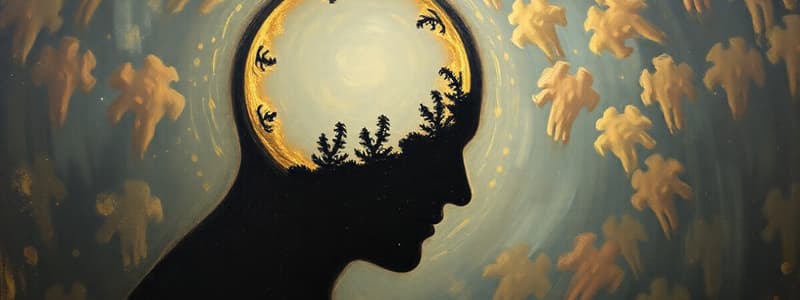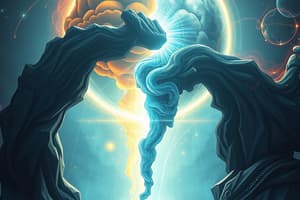Podcast
Questions and Answers
What is the main focus of cultural anthropology?
What is the main focus of cultural anthropology?
- The examination of linguistic structures in languages
- The study of human biological traits
- The analysis of human evolution over time
- The study of human cultures and their various domains (correct)
Which of the following best defines 'rituals' in the context of cultural anthropology?
Which of the following best defines 'rituals' in the context of cultural anthropology?
- Activities performed as a group for fulfilling objectives (correct)
- Random activities performed by individuals
- Spontaneous events that lack structure
- Challenges faced by individuals in a culture
What does the theory of cultural determinism suggest about individuals?
What does the theory of cultural determinism suggest about individuals?
- Individuals are fully responsible for their cultural choices
- Human behavior is purely influenced by genetic factors
- Culture plays a significant role in shaping emotional and behavioral characteristics (correct)
- People can break free from cultural influences completely
How does cultural relativism differ from cultural determinism?
How does cultural relativism differ from cultural determinism?
What is typically considered a core component of culture?
What is typically considered a core component of culture?
Which of the following statements reflects the implications of cultural determinism?
Which of the following statements reflects the implications of cultural determinism?
What misconception about human capability does cultural determinism imply?
What misconception about human capability does cultural determinism imply?
Which term describes individuals recognized for their significant contributions or qualities within a culture?
Which term describes individuals recognized for their significant contributions or qualities within a culture?
What does the process of developing self, according to the Looking-Glass Self concept, start with?
What does the process of developing self, according to the Looking-Glass Self concept, start with?
In the context of Anthropology, which subfield studies man’s social relationships?
In the context of Anthropology, which subfield studies man’s social relationships?
What key aspect differentiates Biological Anthropology from other subfields?
What key aspect differentiates Biological Anthropology from other subfields?
Which aspect of human behavior is most directly influenced by cultural symbols according to anthropological studies?
Which aspect of human behavior is most directly influenced by cultural symbols according to anthropological studies?
What does the term 'face-work' refer to in social interactions?
What does the term 'face-work' refer to in social interactions?
Which subfield of Anthropology focuses on the development of language and communication?
Which subfield of Anthropology focuses on the development of language and communication?
Which aspect is a concern of Cultural Anthropology?
Which aspect is a concern of Cultural Anthropology?
How is the self perceived from the Dramaturgical Approach?
How is the self perceived from the Dramaturgical Approach?
What is the primary focus of biological anthropology?
What is the primary focus of biological anthropology?
Which of the following best describes the concern of linguistic anthropologists?
Which of the following best describes the concern of linguistic anthropologists?
How do symbols manifest in culture according to the content provided?
How do symbols manifest in culture according to the content provided?
Which aspect is particularly important in the study of human evolution?
Which aspect is particularly important in the study of human evolution?
What role does archaeology play in understanding human history?
What role does archaeology play in understanding human history?
In the context of cultural anthropology, how is culture understood?
In the context of cultural anthropology, how is culture understood?
What distinguished feature does biological anthropology examine in relation to humans?
What distinguished feature does biological anthropology examine in relation to humans?
What is a key function of symbols in cultural manifestation?
What is a key function of symbols in cultural manifestation?
Flashcards
Cultural Anthropology
Cultural Anthropology
The study of human cultures, including their beliefs, practices, values, and behaviors, which are socially transmitted from one generation to the next.
Culture
Culture
A group of people's way of life, encompassing their behaviors, beliefs, values, and symbols.
Cultural Determinism
Cultural Determinism
The idea that our culture shapes our emotions, behaviors, and personalities, and we have little control over it.
Cultural Relativism
Cultural Relativism
Signup and view all the flashcards
Rituals
Rituals
Signup and view all the flashcards
Values
Values
Signup and view all the flashcards
Heroes
Heroes
Signup and view all the flashcards
Theory of Cultural Determinism Implication
Theory of Cultural Determinism Implication
Signup and view all the flashcards
Archaeology
Archaeology
Signup and view all the flashcards
Material Remains
Material Remains
Signup and view all the flashcards
Biological Anthropology
Biological Anthropology
Signup and view all the flashcards
Linguistics
Linguistics
Signup and view all the flashcards
Culture
Culture
Signup and view all the flashcards
Symbols
Symbols
Signup and view all the flashcards
Human Past Study
Human Past Study
Signup and view all the flashcards
Self-Concept
Self-Concept
Signup and view all the flashcards
Looking-Glass Self
Looking-Glass Self
Signup and view all the flashcards
Dramaturgical Approach
Dramaturgical Approach
Signup and view all the flashcards
Face-Work
Face-Work
Signup and view all the flashcards
Subject Self
Subject Self
Signup and view all the flashcards
Object Self
Object Self
Signup and view all the flashcards
Anthropology
Anthropology
Signup and view all the flashcards
Archaeology
Archaeology
Signup and view all the flashcards
Looking-Glass Self Phases
Looking-Glass Self Phases
Signup and view all the flashcards
Study Notes
Understanding the Self
- Greeks sought natural explanations, instead of supernatural ones.
- Socrates used the Socratic Method to question assumptions and reveal misconceptions.
- Socrates was declared the wisest man but was confused by this.
- Plato wrote dialogues featuring Socrates.
- Plato described the soul with three parts: reason, spirited, and appetitive.
- Plato's Allegory of the Cave illustrates the difference between shadows (appearance) and reality.
- St. Augustine believed God was the source of reality and truth, while humans were sinful.
- St. Augustine associated love of God with true happiness.
- Rene Descartes believed in the mind-body dualism.
- Descartes' deduction led him to "cogito ergo sum" (I think, therefore I am).
- John Locke believed knowledge comes from experience ("tabula rasa").
- Reflection involves looking at experiences to understand relationships.
- Hume believed that the mind receives impressions from the senses.
- Immanuel Kant argued that the mind actively participates in experience.
- Kant believed the mind has different apparatuses in organizing experience.
- The mind is considered the seat of knowledge acquisition.
- Sigmund Freud described the mind's structure with id, ego, and superego.
The Self from a Sociological Perspective
- Sociology explores how social factors influence thoughts, feelings, and actions.
- George Herbert Mead's social behaviorism suggests that the self is shaped by social interactions.
- Mead's stages of self-formation include preparatory, play, and game stages.
- Self-development is a social process, not innate.
- The self is shaped by the environment and culture.
The Self from an Anthropological Perspective
- Anthropology focuses on the study of humans across cultures and time.
- Archaeological studies explore the ancient human past.
- Cultures manifest in symbols, heroes, rituals, and values.
- Cultural determinism suggests culture shapes individuals.
- Cultural relativism emphasizes understanding different cultures on their own terms.
- Biological anthropology explores human evolution and diversity.
Impression Management
- Goffman's perspective focuses on how people manage impressions and present themselves.
- People strategically present a particular image to others.
- This process is akin to theatrical presentations and face-saving measures are used in everyday life.
- The self is a performance, managed carefully in social situations.
The Looking-Glass Self
- Cooley's looking-glass self describes how individuals develop their self-concept based on how they believe others perceive them.
- This involves imagining how others see us, visualizing their judgments, and forming self-perceptions.
Studying That Suits You
Use AI to generate personalized quizzes and flashcards to suit your learning preferences.




